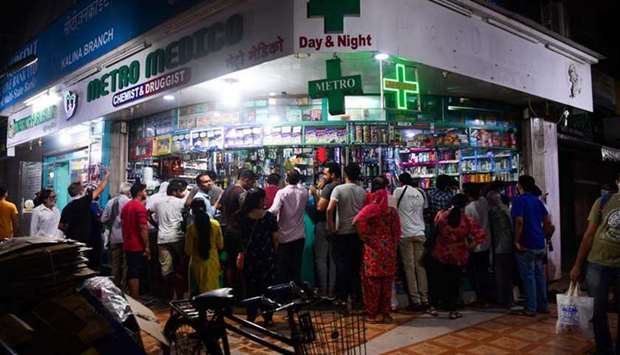India ordered a 21-day lockdown of its 1.3bn people yesterday to try to protect the world’s second most populous country from the coronavirus spreading around the world.
Health researchers have warned that more than a million people in India could be infected with the coronavirus by mid-May, prompting the government to shut down all air and train travel, businesses and schools.
Yesterday, Prime Minister Narendra Modi went further, saying nobody in the world’s biggest democracy will be allowed to leave their homes for the next three weeks.
“The only way to save ourselves from coronavirus is if we don’t leave our homes, whatever happens, we stay at home,” Modi said in a second address in less than a week to try and rally around Indians behind the sweeping lockdown.
“Every district, every lane, every village will be under lockdown,” he said.
A raft of lockdown measures had already been brought in by individual states – including sealing borders and restricting movement to only essential services – to try and prevent an explosion of cases.
Modi warned that people had to observe the lockdown if they wanted to stop the spread of the deadly virus.
“This is a curfew... We will have to pay economic cost of this, but to save every family member, this is the responsibility of everyone – the biggest priority,” the prime minister added.
“If these 21 days are not managed, the country and your family will go back 21 years... I am not saying this as your prime minister, I am saying it as your fellow citizen, family member.”
Under the order, people could face up to two years in jail and an unspecified financial penalty if they flout the rules.
Within minutes of Modi’s speech announcing the world’s largest lockdown, people were seen rushing to stores to buy groceries.
In New Delhi, some people in their pyjamas ran towards nearby shops despite heavy rain to stock up, while in the financial capital Mumbai, long lines of masked people formed outside pharmacies and supermarkets.
In Ghaziabad in Uttar Pradesh, police patrolled streets and used loud megaphones to tell residents to stay indoors.
Following his speech, Modi tweeted: “THERE IS ABSOLUTELY NO NEED TO PANIC.”
“Essential commodities, medicines etc. would be available. Centre and various state governments will work in close co-ordination to ensure this,” he added.
Local media reported that state leaders would announce the timings of when people could buy essential items.
“This lockdown is needed,” virologist Shahid Jameel of biomedical research charity Wellcome Trust/DBT India Alliance said after the announcement. “If this is not done now we would be looking at six to eight weeks later, with many more deaths.”
“But it’s going to be very hard on the poor and vulnerable. I hope there is a plan in place. The devil is always in the details,” he added.
All social, political, sports, entertainment, academic, cultural and religious gatherings would be banned, the order said.
All transport services including air, rail and road, would be suspended. A maximum of 20 people would be allowed to attend a funeral.
People working in essential services such as hospitals, police and media were exempted from the stay-at-home order, authorities added.
E-commerce giant Amazon, which has a big presence in India, said in a statement on its website that it would only sell “high priority” products to customers.
India has found 482 cases of the coronavirus and 10 people have died from the Covid-19 disease it causes but alarm is growing across the region about prospects for its spread into impoverished communities and the ability of resource-starved public health sectors to cope.
Already health officials said the virus was spreading out of big cities where it first appeared into the small towns that dot the landscape.
Modi acted just a day after the World Health Organisation called for aggressive action by India, saying it was critical to the global fight against the disease.
India’s population is even more densely packed than China’s.
“The future of this pandemic to a greater extent will be determined by what happens with very large, densely populated countries,” Dr Mike Ryan, executive director of WHO’s emergencies programme, said.
“So it’s really, really important that India continues to take aggressive action at the public health level and at the level of society to contain, control and suppress this disease.”
“It is a decisive decision – a difficult one, but probably the right one,” said Partha Chatterjee, professor of economics at Shiv Nadar University near New Delhi.
“The first priority is to save lives and then think of reconstruction.”

People gather at a pharmacy to buy supplies following Prime Minister Narendra Modi’s announcement of a government-imposed nationwide lockdown as a preventive measure against the Covid-19 in Mumbai yesterday.
